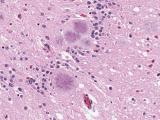Feb 20, 2003 (CIDRAP News) – An investigation of the deaths of three men who had shared wild game feasts at a Wisconsin cabin revealed no evidence that the men's degenerative brain diseases were related to chronic wasting disease (CWD) in deer, according to the Center for Disease Control and Prevention (CDC).
The CDC investigated the three deaths because of concern that CWD in deer might be able to jump to humans who eat infected venison. The concern is based on evidence that bovine spongiform encephalopathy (BSE), or mad cow disease, causes variant Creutzfeldt-Jakob disease (CJD) in people who eat beef from infected animals.
Only one of the three men who died had confirmed CJD, and he was unlikely to have eaten CWD-infected venison, the CDC reported in the Feb 21 issue of Morbidity and Mortality Weekly Report.
"Because only one of the three cases in Wisconsin had neuropathologic confirmation of a prion disease, no association could be made between case participation in the wild game feasts and the development of CJD," the article states. The man who died of CJD probably did not eat infected venison because the venison served at the meals did not come from CWD-endemic areas and because he shared only one of the meals.
In addition, the CDC found no evidence of degenerative neurologic disease in 31 other people who were reported to have shared in game feasts at the same Wisconsin cabin. Four of these had died of causes other than neurologic disease, and the rest were still living and had no signs or symptoms of brain disease, the article says.
One of the three men who died was a lifelong hunter and hosted wild game feasts at his Wisconsin cabin from 1976 until he died in 1993, the CDC reported. Evidence from autopsy initially suggested that he had died of CJD, but further tests did not support that finding. A second man was also a Wisconsinite and lifelong hunter who regularly took part in the game meals at the cabin. He died in 1993 of what was thought to be Pick's disease; postmortem examination did not point to CJD.
The man whose disease was found to be CJD was a Minnesotan who died in 1999, the report says. He had visited the Wisconsin cabin about a dozen times but had eaten wild game only once. Analysis of his brain tissue suggested that his disease was the most common form of sporadic CJD, "without apparent unusual neruopathologic or molecular characteristics that might occur if the prion related to CWD had been responsible for the disease," the CDC said.
The CDC reported it could not interview some of the people who were thought to have eaten game at the Wisconsin cabin. "Limited epidemiologic investigations cannot rule out the possibility that CWD might play a role in causing human illness," and continued surveillance of CJD is important, the article states.
CDC. Fatal degenerative neurologic illnesses in men who participated in wild game feasts—Wisconsin, 2002. MMWR 2003;52(7) [Full text]
















